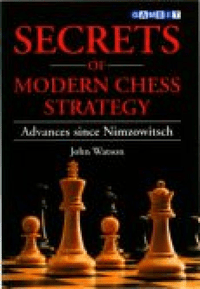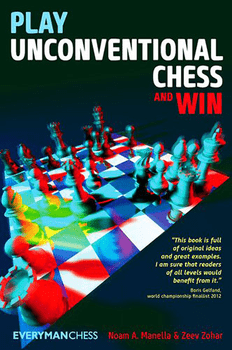| Nivå | C-D |
| Utgivelsesdato | September 2014 |
| Forfatter | |
| Pris | 280 NOK |
Play Unconventional Chess and Win
En original bok som viser noe av sjakkspillets spennvidde og paradokser på høyt plan, både før og etter at spillemotorene fikk prege sjakkmesternes spill. Boris Gelfand er blant dem som priser denne boka av sine to israelske landsmenn.
Forfatternes forord
Experienced chess players, those who learned the game some decades ago (or even recently), are sometimes puzzled while being in the tournament hall or watching a live broadcast of a top game. Do they witness a game between two wise and experienced people, having enormous knowledge combined with a unique creative ability, or is it rather a battle between machines, cold, technical, me chanical super-computers which happen also to have bodily needs, feelings and desires?
The influence of technological tools over the game of chess is controversial. Some think that chess players become robotic, lose all cr eativity and avoid taking any risk. The inevita- ble outcome is a lot of unintere sting games ending in a draw. Back in our youth, when chess programs ha d not yet been used, the players found the moves “over the board”. The first impression is that the game was then slightly different, and that nowadays we witness the decay of cl assical chess. Our intu ition suggests that top players find it hard to play creatively, and the computer play s an important role in this situation. The fact that those top players an d their seconds spend most of their time pre- paring while looking at the computer monitor surely contributes to this.
However, others think that technological ad vances have made a huge amount of in- formation available to chess players. Thus they can solve, within a short time, problems which were hitherto considered too complex. Today’s players have more resources to look for new creative ideas, and those emerge in abundance. One of the co-authors, Zeev Zohar, a chess ex pert, has investigated this subject deeply as part of his academic work. He looked deep ly at the arguments of both sides while inter- viewing professional chess players as well as chess software developers. Finally he became convinced that technological tools do contri bute toward creativity of top human chess players. He shared his conclusions with Noam Manella, who is a well-known expert in the field of creativity, besides be ing a chess national master an d study composer whose works have received many awards. Mr. Manella, author of the best-selling book The Creative Code, was highly enthusiastic about the su bject. Thus this book was born.
Chess is a game based on patterns, axioms, rules and mathematical calculations. A computer has no psychological barriers. It is “willing” to check moves that most humans, including top players, reject instantly as part of a psychological elimination process based on paradigms. Computer-aided home analyses of top chess players leads to a reassessment of all old axioms, principles and evaluations. Hence one can easily understand why work with computers adds a new creative layer to the game.
In this book we have put together numerous examples of games, most of them played by leading grandmasters – in which we foun d some weird moves, apparently contradicting the most fundamental principles. Our litmus test for the choice of games to appear in this book was simple: we only chose moves which look “irrational” at first sight, or “drunk” in our language – moves which violate basic ches s rules. Another test applied to our candidate games was: Could the spectator tell imme diately whether this move was played by a professional or a beginner? If there is no clear-cut answer to this question, you are likely to find the game in this book.
We were greatly helped in chess analysis by Israeli grandmaster Ram Soffer, former editor of the Israeli Chess Magazine and author of several chess books and numerous articles. Mr. Soffer also contributed some ideas which found their way into this book. Most of our games were played during the computer era, but there are some older ex- amples too. We decided to include games from the pre-computer era, since, in our opinion, one has to know the past in order to underst and the future. Those old games form the base of the changes happening in chess right now.
The frequency of the games which incorporate “new chess” – brea king the established patterns – has been increasing recently. There is a fair number of top players, including the new world champion, who may sometimes surprise us with an absurd-looking move. However, careful analysis may reveal the depth of their conception.
Of course, there have always been very creative chess players who played absurd, “against the rules” moves from time to time, but it seems that the frequency of these moves was lower in previous decades. We have found numerous such examples in the games of Vassily Ivanchuk (nicknamed Planet Ivanchuk), and the book includes many more by such well-known names as Carlsen, Anand, Kramnik, Shirov and Morozevich. In our opinion, this subject may be interesting not only for chess players of all levels, amateurs as well as professionals, but for computer experts and researchers of artificial intelligence as well. We invite you to take a glass of drink and start, together with us, a fascinating journey of release from fixed ideas.
Zeev Zohar, Noam Manella
July 2014
Forlagets omtale
The computer has changed the way top players think about chess.
The silicon mind has no psychological barriers. It is willing to check moves that most humans, including top players, consider absurd and reject instantly. Thus this brave, new computer era inevitably leads to a reassessment of old axioms, principles and evaluations.
In this book the reader will discover the incredible power unconventional moves can have. These moves contradict the most fundamental principles of the old chess , and yet most of them played by leading grandmasters.
At first sight these moves look so strange that the reader can not avoid asking, Was this grandmaster was inspired or drunk? The answer will definitely surprise you.
We are living in a time when a huge amount of data is available for chess players, but it is also a drawback because we have too much data! This is the paradoxical reason why the importance of a book, and especially of a good book, grows! That's why I am very happy to note that Israeli authors Noam A. Manella and Zeev Zohar have come up with 'Play Unconventional Chess and Win'. This book can be both enjoyable and useful, as it is full of original ideas and great examples. I would like to congratulate the authors on their first book, and I am sure that readers of all levels would benefit from it.
Boris Gelfand, World Championship finalist 2012...
I wish the authors the very best and look forward to enjoying the book and its entertaining analysis.
Vishy Anand, former World Champion
| Innbundet? | Nei |
| Type | Bok |
| Språk | Engelsk |
| Antall sider | 387 |
Se også
-

Secrets of Modern Chess Strategy Advances since Nimzowitsch
KjøpIM John Watsons monumentale bok om sjakkstrategiens utvikling siden Aron Nimzowitsch.
- Pris
- 255
- Nivå
- C-D
- Av
- Utgivelsesdato
- September 2001

